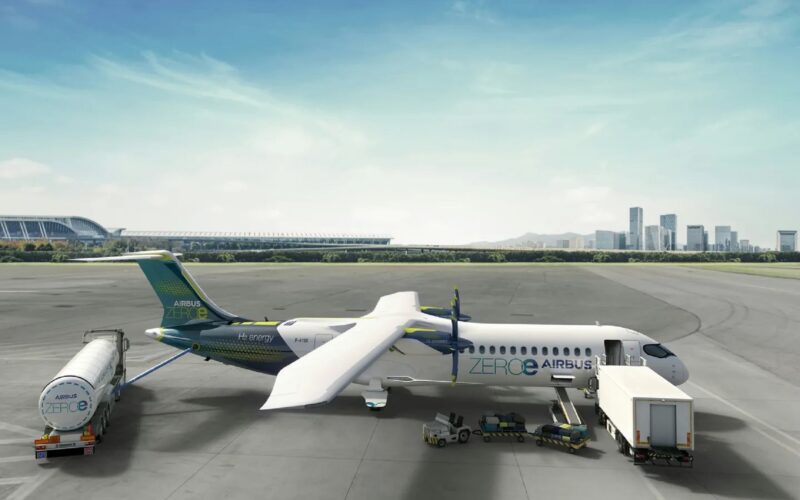Airbus is to lead an alliance of industry partners in researching aviation hydrogen handling and refueling at three selected European airports.
The group of academic partners, airport operators and hydrogen-industry companies will work with Airbus to demonstrate how small-scale liquid hydrogen aircraft ground operations can be managed.
The four-year project, at Rotterdam The Hague Airport (RTM), Stuttgart Airport (STR) and Budapest Airport (BUD), will run as Europe searches for solutions to the decarbonization of short and medium-haul aviation.
Dubbed the GOLIAT (Ground Operations of LIquid hydrogen AircrafT) project, the research will receive €10.8 million ($11.7M) from the EU’s Horizon Europe Framework Programme. It will specifically demonstrate how high-flow liquid hydrogen (LH2) handling and refueling technologies can be developed and used safely and reliably for airport operations.
The GOLIAT consortium consists of 10 partners from eight countries: Airbus (France, Germany, UK), Chart Industries (Czech Republic, Italy), TU Delft (Netherlands), Leibniz University Hannover (Germany), Royal Schiphol Group (Netherlands), Rotterdam The Hague Airport (Netherlands), Vinci Airports (France, Portugal), Stuttgart Airport (Germany), H2FLY (Germany), and Budapest Airport (Hungary).
The group will support the aviation industry’s adoption of LH2 transportation and energy storage solutions by:
- developing and demonstrating LH2 refueling technologies scaled-up for future large commercial aircraft;
- demonstrating small-scale LH2 aircraft ground operations at airports;
- developing the standardization and certification framework for future LH2 operations;
- assessing the sizing and economics of the hydrogen value chains for airports.
Karine Guenan, Vice President of ZEROe Ecosystem at Airbus, said: “We continue to believe that hydrogen will be an important fuel for the future of short-haul aviation. We welcome the opportunity to help build the operating case for the widespread daily use of liquid hydrogen at airports.”
According to Airbus, LH2 offers a promising solution for reducing the greenhouse gas emissions associated with airport operations and their dependence on fossil fuels, and its high energy density enables long-range travel for aircraft.
However, for hydrogen to be widely deployed, there is a need to better understand the operational, regulatory, economic and safety impacts, as well as the capacity and performance of hydrogen technologies.
It is hoped that the GOLIAT project will provide a greater insight into how the technology will work on the ground.
Ulrich Heppe, CEO of Stuttgart Airport, said: “From the outset, it has been clear to us in Stuttgart that hydrogen will play a central role. At Stuttgart Airport we see our role as an enabler, working with partners to find solutions early on that can be implemented on a large scale. With GOLIAT, we take a major step forward that will empower airports and airlines to transform aviation in the next years.”

